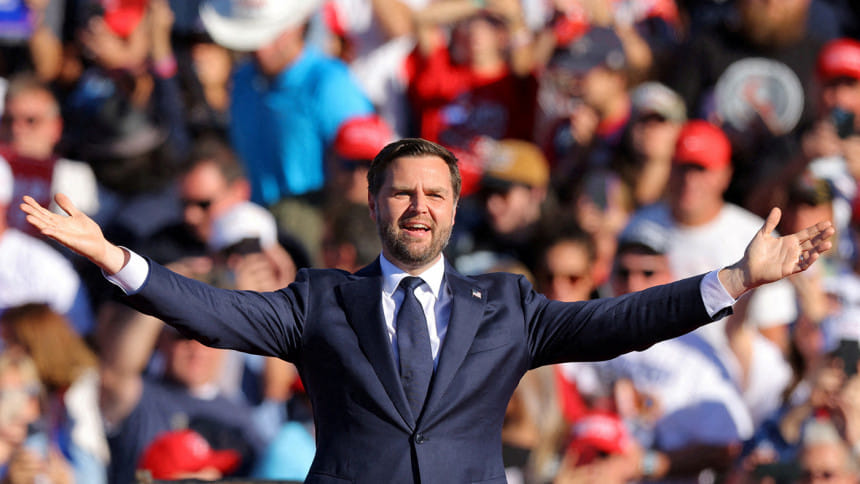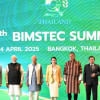JD Vance once compared Trump to Hitler, now vice president-elect

Eight years ago, in the lead-up to the 2016 presidential election, JD Vance was a bitter critic of Donald Trump.
Publicly, he called the Republican businessman an "idiot" and said he was "reprehensible." Privately, he compared him to Adolf Hitler.
But by the time the former president tapped Vance to be his running mate in July, the Ohio native had become one of Trump's most ardent defenders. With Trump's decisive win in Tuesday's presidential election, Vance, 40, also became the heir apparent to Trump's re-energized Make America Great Again movement.
Vance's transformation - from self-described "never Trumper" to stalwart loyalist - makes him a relatively unusual figure in Trump's inner circle. Just two years into his first term as a U.S. senator, the only public office he has held, Vance will be one of the country's youngest-ever vice presidents.
Democrats and even some Republicans have questioned whether Vance, author of the 2016 bestselling memoir "Hillbilly Elegy," is driven more by opportunism than ideology.
But Trump and many of his allies and advisers see Vance's transformation as genuine.
They say that Vance's political beliefs - which mix isolationism with economic populism - dovetail with those of Trump and put both men at odds with the old guard of the Republican Party, where foreign policy hawks and free market evangelists still hold sway.
Conservative commentator Tucker Carlson, a vocal Vance supporter, told Reuters that Vance understood what Trump was running on - "and, unlike the rest of the Republican Party in Washington, agrees with it."
While the contours of Trump's second administration are still fuzzy, Vance, a Yale Law graduate, could play a role in policy formulation.
"I really do believe that with better leadership we are on the cusp of a golden age of American prosperity," Vance said at an Arizona rally last week.

MODEST ROOTS
Vance was born into an impoverished home in southern Ohio, and his story of modest origins was a key part of his stump speech.
Some Trump advisers who supported his selection as the Republican's running mate argued he could boost the campaign's Rust Belt bona fides in a race that would be determined by voters in a handful of battleground states, including nearby Pennsylvania and Michigan.
At first, Vance's hardcore conservative views and sometimes-awkward appearances on the trail gave Trump allies and donors pause. Democrats re-surfaced 2021 comments in which Vance disparaged women without children as "childless cat ladies," potentially hurting the campaign's standing among women.
But as the race wore on, Vance showed some prowess at tailoring his message to his audience.
In September, Vance amplified a baseless conspiracy theory holding that Haitian immigrants were eating household pets in Ohio, a false tale that energized Trump's conservative base. Trump repeated it during his debate with Vice President Kamala Harris.
Just weeks later, however, Vance came off as conciliatory and warm in a debate with Minnesota Governor Tim Walz, the Democratic vice-presidential candidate, showing a level of discipline Trump often lacks.
"Turned out to be a good choice," Trump said of Vance on Wednesday as they addressed cheering supporters, with Trump noting he had "taken a little heat" at first for picking the polarizing senator as his No. 2.
GRADUAL EVOLUTION
After serving in the Marine Corps, attending Yale Law and working as a venture capitalist in San Francisco, Vance rose to national prominence thanks to his memoir. In the book, he explored the socioeconomic problems confronting his hometown and attempted to explain Trump's popularity among impoverished white Americans to readers.
He was harshly critical of Trump, both publicly and privately, in 2016 and during the opening stages of Trump's 2017-2021 term in the White House.
"I go back and forth between thinking Trump is a cynical asshole like Nixon who wouldn't be that bad (and might even prove useful) or that he's America's Hitler," he wrote privately to an associate on Facebook in 2016.
When his Hitler comment was first reported, in 2022, a spokesperson did not dispute it, but said it no longer represented Vance's views.
By the time Vance ran for Senate in 2022, his demonstrations of loyalty - which included downplaying the Jan. 6, 2021 attack on the U.S. Capitol by Trump's supporters - were sufficient to score the former president's coveted endorsement. Trump's support helped put him over the top in a competitive primary.
In media interviews, Vance has said there was no "Eureka" moment that changed his views on Trump. Rather, he gradually realized that his opposition to the former president was rooted in style rather than substance.
For instance, he agreed with Trump's contentions that free trade had hollowed out middle America by crushing domestic manufacturing and that the nation's leaders were too quick to get involved in foreign wars.
"I allowed myself to focus so much on the stylistic element of Trump that I completely ignored the way in which he substantively was offering something very different on foreign policy, on trade, on immigration," Vance told the New York Times in June.
In the same interview, Vance said that he met Trump in 2021 and that the two grew closer during his Senate campaign.
The Ohio senator's detractors see his shift in views as a cynical ploy to ascend the ranks of Republican politics.
"What you see is some really profound opportunism," said David Niven, an associate professor of politics at the University of Cincinnati who has worked as a speechwriter for two Democratic governors.
One issue where Vance's position appears to have converged with Trump is abortion.
Vance implied in a 2021 interview that victims of rape and incest should be required to carry pregnancies to term, and in November 2023 he described a vote by Ohioans to add the right to abortion care to the state's constitution as a "gut punch."
This year, he said he supports access to the abortion pill mifepristone, a view that Trump shares.
RELATIONSHIP WITH TRUMP
Before Vance developed a relationship with the president-elect, he grew close with Trump's eldest son, Donald Trump Jr., according to several people familiar with their relationship. Both are now key figures in the presidential transition effort.
Vance first caught Trump Jr.'s eye when he opposed aid to Ukraine during the Ohio Senate primary in 2022, according to one of those people, a position that put him at odds with the other Republicans in the race.
Vance's personal relationship with Trump developed for the most part during the Republican presidential primary earlier this year, that person said. Vance's decision to endorse Trump in January 2023, well before some other vice-presidential hopefuls, served as an important demonstration of loyalty, that person added.
In February 2023, Trump and Vance visited East Palestine, Ohio, the site of a toxic train derailment, a trip that raised Vance's national profile. They portrayed Democratic President Joe Biden's decision at the time not to visit the working-class community as a betrayal of middle America.
The White House noted at the time that federal agents were on the scene almost immediately after the derailment, and that visiting a disaster site can distract from local recovery efforts. Biden eventually visited East Palestine roughly a year later, in February 2024.
Behind the scenes, Vance helped convince wealthy donors to open their wallets to Trump, according to two people with knowledge of Trump's fundraising operations. Vance, for instance, helped put together a Bay Area fundraiser in June hosted by venture capitalists David Sacks and Chamath Palihapitiya, one of those people said.
Vance's skepticism of corporate America, support for tariffs, weariness of foreign entanglements and his youth make him a leading voice of a new Republican Party that is more focused on the working class than big business in the eyes of supporters.
But detractors say he has merely copied Trump, in a brazen attempt to climb the rungs of power as quickly as possible.
"Vance is an echo to Trump," said Niven, "not a new voice."

 For all latest news, follow The Daily Star's Google News channel.
For all latest news, follow The Daily Star's Google News channel. 








Comments